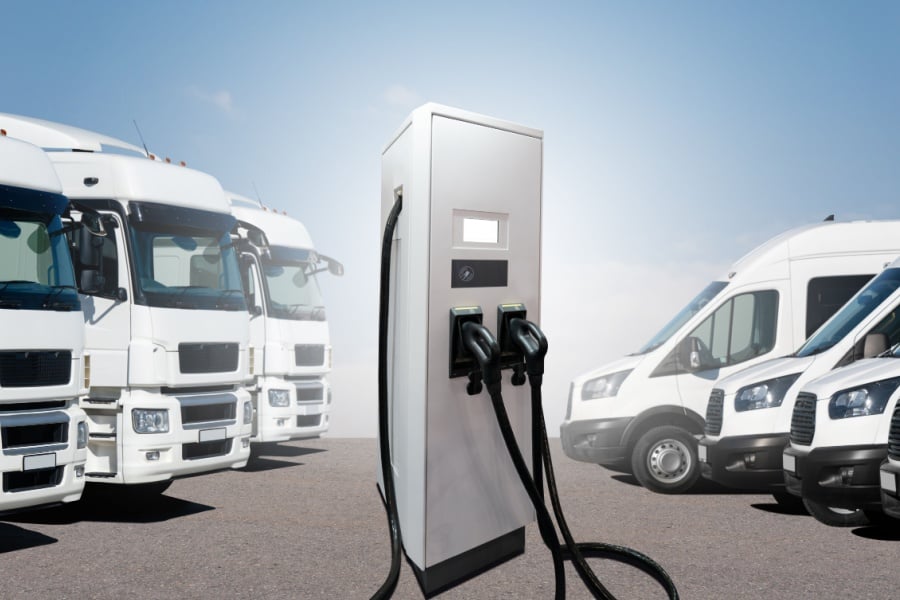Logistics
Warehousing & Fulfillment
Transportation
E-commerce
E-commerce Fulfillment Services
Lease & Maintenance
Semi Trucks
Supply Chain Technology
Logistics
E-commerce
Lease & Maintenance
Buy Used Trucks

Updated October 23, 2024
Do you operate a warehouse in California’s South Coast Air Quality Management District (SCAQMD) that is 100,000 square feet or larger? If yes, you may want to be familiar with the requirements imposed by the Warehouse Actions and Investments to Reduce Emissions (WAIRE) program and your options. This article will unpack what WAIRE is, select WAIRE requirements, and how electric yard tractors and other electric vehicles (EVs) can help you achieve WAIRE points.
What is the WAIRE Program?
The SCAQMD enacted an indirect source rule called the WAIRE program (Rule 2305) in May 2021 to reduce transportation emissions associated with warehouse operations. The WAIRE program applies to warehouse owners and operators of warehousing facilities that are 100,000 square feet or larger in the South Coast Air Basin, which covers most of Los Angeles, San Bernardino, Riverside, and Orange Counties.
Select WAIRE Requirements and Reporting
Every year, WAIRE requires warehouse operators to track, report, and accrue WAIRE Points Compliance Obligations (WPCO) based on all the Class 2b-8 truck trips in and out of the facility. A facility’s WPCOs are tallied during preparation of the Annual WAIRE Report (AWR) and must be offset by implementing mitigation activities from the WAIRE menu to earn “WAIRE Points” equivalent to their WPCOs.
Mitigation activities may include purchasing or leasing electric vehicles (EVs), installing charging stations, and installing solar panels. If WAIRE Points earned do not offset WPCOs, the warehouse operator may be required to pay a mitigation fee per WPCO.
To help assess possible obligations and options, please review the SCAQMD actions in the WAIRE menu.
Summary of Select WAIRE Requirements
How Electric Vehicles Can Help
One way to earn WAIRE Points is by integrating zero emission or near-zero-emission vehicles into warehouse operations. This includes the use of electric yard tractors and other EVs, which offer multiple benefits.
Ryder offers light-, medium-, and heavy-duty electric commercial vehicles, including electric yard tractors with the industry’s only comprehensive EV solution.
RyderElectric+ is a turnkey solution that navigates the EV landscape for you and provides electrification advisors, vehicles, chargers, telematics, and maintenance all for one price, from one point of contact.
EVs and WAIRE
Utilizing EVs: Some companies have found that leasing EVs have helped them not only earn WAIRE Points, but also to meet their WAIRE obligations for multiple reporting years.
Installation of Charging Stations: The permitting, construction and use of EV charging stations are also activities that earn WAIRE Points.
Possible Consequences of Non-Compliance
Failure to comply with WAIRE requirements could result in penalties, including notices of violation and potential civil or criminal penalties established by SCAQMD. Warehouse owners and operators subject to WAIRE will want to stay informed and take proactive steps to meet their WAIRE obligations with a trusted advisor.
Support from Ryder
Ryder is at the forefront of identifying new truck technology for operational advancements and acts as an extended research and development arm for its suppliers and customers.
Ryder monitors advanced and emerging technology, and works closely with technology providers, suppliers, and original equipment manufacturers (OEMs), to improve functionality, usability, and adaptability for commercial truck applications.
As a leader in the commercial transportation industry, Ryder possesses in-depth knowledge of vehicle emissions regulations, and has relationships with OEMs to help you obtain the vehicles you need to meet your needs.
Through RyderElectric+, Ryder electrification advisors can work with you to help simplify the electrification process, so you can focus more on your core operations while benefiting from industry leading expertise and tailored solutions.